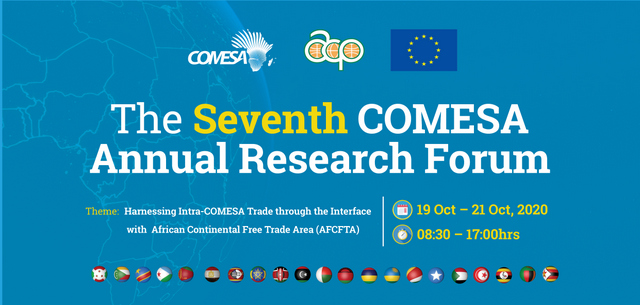
PRESS RELEASE
Monday, October 19, 2020: There is need for proper management of the interface between the continental and the regional free trade regimes to generate a range of win-win outcomes for various stakeholders in Africa’s integration agenda.
According to Dr. Stephen Karingi, the Director, Capacity Building Development at the United Nations Economic Commission for Africa (UNECA), the successful implementation of the African Continental Free Trade Area (AfCFTA) will depend, on how smoothly or otherwise, it is interfaced with pre-existing regional economic communities FTAs and related instruments.
He was speaking during his keynote address at the opening of the 7th COMESA Annual Research Forum whose theme is “Harnessing Intra-COMESA Trade through the Interface with African Continental Free Trade Area (AfCFTA)”.
“One of the main objectives of the AfCFTA is to accelerate regional and continental integration through the consolidation of the multiple and overlapping trading regimes, embodied in pre-existing RECs FTAs, such as the COMESA,” Dr Karingi noted.
“However, as law scholars have already argued, some wordings in the AfCFTA Agreement suggest that this relationship is likely to be more complex. And although this is not what was originally imagined, it now needs to be properly analysed and understood.”
He cited Articles 5 and 19 of the AfCFTA which are intended to help navigate the complexity of the relationship with pre-existing intra-African trade instruments. Article 5 for example, does not only recognize ‘RECs’ Free Trade Areas as building blocs for the AfCFTA,it also points to the need to leverage their best practices.
Further, Dr Karingi noted that some RECs, individually or collectively, have made great strides in some dimensions of integration, way ahead of what is currently envisioned in the AfCFTA with four African Union-recognized RECs having FTAs that have achieved higher levels of integration than the AfCFTA at the time of its entry into force.
He therefore observed that the AfCFTA, could lean on the progress that RECS such as COMESA have made in important areas of integration including the COMESA Investment Area, COMESA Competition Policy, COMESA’s progress on the issue of Intellectual Property Rights, and the COMESA Digital FTA.
He added: “The AfCFTA can also benefit from COMESA’s experience in building trade supporting institutions, such as in the areas of trade finance, trade insurance, regional payment systems, and in the context of simplified trade regimes.”
By safeguarding the achievements of RECs, he observed, the AfCFTA has in the short run, allowed for some level of flexibility on the co-existence of a web of connected, yet distinct, trade regimes, which would be consolidated at some later stage. He said this requires careful and thoughtful management – backed by evidence-based research which the COMESA Forum provides.
In her statement, the Secretary General (SG) of COMESA Chileshe Kapwepwe noted that since 1950s, there has been a proliferation of regional integration agreements (RIAs), making them the centerpiece of many questions of global governance.
“For instance, do RIAs deliver the intended benefits for members? Why do governments sign these agreements, and do they work towards attainment of anticipated long-term consequences of doing so? Within the context of the Africa Continental Free Trade Area, what for instance are the optimal options for allocation of duties between regional economic communities, ACFTA, Member States and Private Sector? ” she posed.
“These are questions that only in-depth research and analysis can find appropriate solutions.”
The SG said the capacity building interventions in research and training carried out by COMESA are aimed at enhancing not only the capacity of the COMESA Secretariat but also that of the Member States in economic and trade policy analysis and research, as well as trade negotiations.
Mr. Escipión OLIVEIRA GÓMEZ, Assistant Secretary General Structural Economic Transformation and Trade, Organisation of African, Caribbean and Pacific States (OACPS) said the COVID-19 pandemic has demonstrated that no country or region can go it alone. His organization was therefore keen to collaborate with regional economic communities towards implementation of innovative initiatives to promote integration.
Mr. Prudence Sebahizi, the Chief Advisor of AfCFTA & Head of AfCFTA Negotiations Unit, Africa Union Commission (AUC) kicked-off the presentations with a status report on the AfCFTA negotiations and the Interface between AfCFTA and regional economic communities.
The three days Forum will review nine best research papers selected from a list of 39 submitted to COMESA in response to a call for papers made early this year. It is funded by COMESA, OACPS and the European Union.
Corporate Communications

